(完整版)小学英语一般疑问句和特殊疑问句(附练习题)(可编辑修改word版)
小学英语句型转换练习题及答案word版

小学英语句型转换练习题及答案word版一、将下列句子改为一般疑问句,并给出肯定和否定回答。
1. She is a teacher.- 一般疑问句:Is she a teacher?- 肯定回答:Yes, she is.- 否定回答:No, she isn't.2. They have a big house.- 一般疑问句:Do they have a big house?- 肯定回答:Yes, they do.- 否定回答:No, they don't.3. He can play the guitar.- 一般疑问句:Can he play the guitar?- 肯定回答:Yes, he can.- 否定回答:No, he can't.二、将下列句子改为否定句。
1. We like apples.- 否定句:We don't like apples.2. They are playing football.- 否定句:They aren't playing football.3. She goes to school by bus.- 否定句:She doesn't go to school by bus.三、将下列句子改为特殊疑问句,并给出答案。
1. The cat is under the table.- 特殊疑问句:Where is the cat?- 答案:The cat is under the table.2. He has three brothers.- 特殊疑问句:How many brothers does he have? - 答案:He has three brothers.3. She is going to the park tomorrow.- 特殊疑问句:When is she going to the park? - 答案:She is going to the park tomorrow.四、将下列句子改为现在进行时。
一般、特殊、选择疑问句专题讲解(附习题答案)
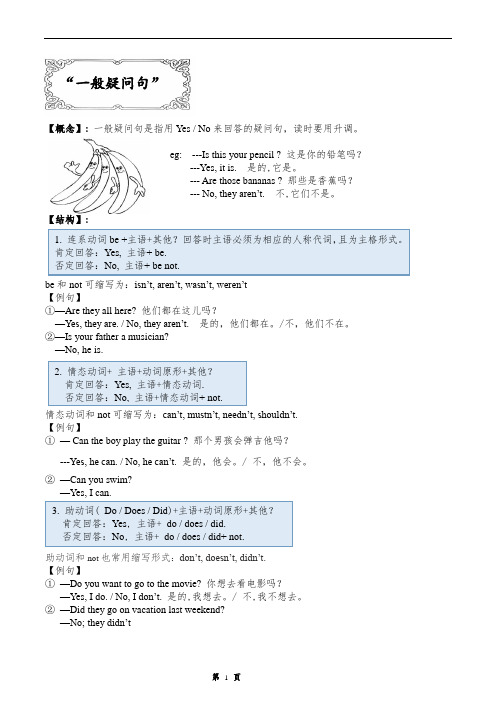
“一般疑问句”【概念】: 一般疑问句是指用Yes / No 来回答的疑问句,读时要用升调。
eg: ---Is this your pencil ? 这是你的铅笔吗?---Yes, it is. 是的,它是。
--- Are those bananas ? 那些是香蕉吗? --- No, they aren’t. 不,它们不是。
【结构】:be 和not 可缩写为:isn’t, aren’t, wasn’t, weren’t 【例句】①—Are they all here? 他们都在这儿吗?—Yes, they are. / No, they aren’t. 是的,他们都在。
/不,他们不在。
②—Is your father a musician? —No, he is.情态动词和not 可缩写为:can’t, mustn’t, needn’t, shouldn’t. 【例句】① — Can the boy play the guitar ? 那个男孩会弹吉他吗?---Yes, he can. / No, he can’t. 是的,他会。
/ 不,他不会。
② —Can you swim?—Yes, I can.助动词和not 也常用缩写形式:don’t , doesn’t , didn’t . 【例句】① —Do you want to go to the movie? 你想去看电影吗?—Yes, I do. / No, I don’t. 是的,我想去。
/ 不,我不想去。
② —Did they go on vacation last weekend?—No; they didn’t1. 连系动词be +主语+其他?回答时主语必须为相应的人称代词,且为主格形式。
肯定回答:Yes, 主语+ be. 否定回答:No, 主语+ be not.2. 情态动词+ 主语+动词原形+其他?肯定回答:Yes, 主语+情态动词. 否定回答:No, 主语+情态动词+ not. 3. 助动词( Do / Does / Did )+主语+动词原形+其他? 肯定回答:Yes , 主语+ do / does / did . 否定回答:No , 主语+ do / does / did+ not .学习小贴士【一般疑问句的问答】:回答一般疑问句时有肯定回答和否定回答两种方式,肯定回答以Yes开头,否定回答用No开头。
(完整版)英语一般疑问句和特殊疑问句的讲解及练习

一般疑问句用be动词(am /is主语+其他成分,+主语+提问的词.否定:No,+主语+提问的词+not.Are you from Japan﹖Yes ,I am./ No, I'm not.Is her sister doing her homework now﹖Yes, she is./ No, she isn't.Does he work in a bank﹖Yes, he does./ No, he doesn't.Can you speak French﹖Yes, I can./ No, I can't.一: 般疑问句还有下列特点:1、以be动词、助动词或情态动词开头;例:Is your father a teacher? Does Catherine like animals? Can Jenny speak French?二: 如何将陈述句变成一般疑问句?1.如句中有be 动词(am、is、are、was、were can、may、must …)或助动词(do、does、did、have、had(完成时中))时,可直接将它们提到句首,句末打上问号即可。
主语为第一人称,应将其改为第二人称。
例:It was rainy yesterday.→Was it rainy yesterday?Tom's father can play the piano.→Can Tom's father play the piano?I have finished my homework.→Have you finished your homework?2.如果句中没有be动词、助动词或情态动词,则根据谓语动词的形式借助do的相应形式放在句首。
具体方法是:如果谓语动词是原形,则借do;如果谓语动词是一般现在时第三人称单数形式,则借does;如果谓语动词是过去式,则借did. 需要注意的是,借does或did后,原句的谓语动词要变回原形。
一般疑问句与特殊疑问句练习
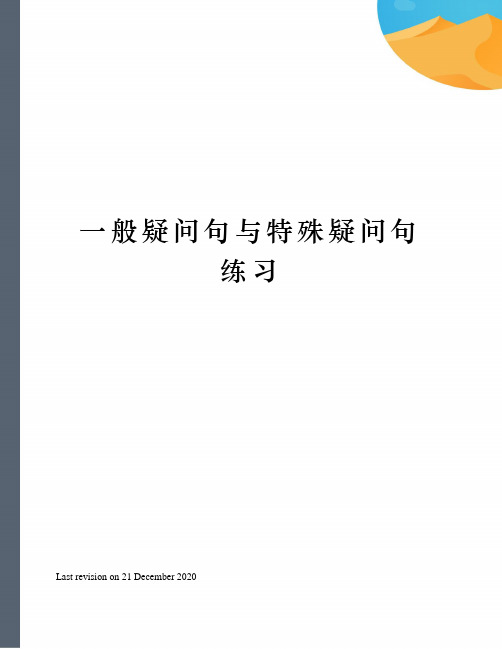
一般疑问句与特殊疑问句练习Last revision on 21 December 2020一般疑问句与特殊疑问句巩固练习(一)1.She is quiet.(改为一般疑问句) ______________________________2.He is very tall.(对划线部分提问) ______________________________3.Is Mr. Smith tall and strong(作肯定回答) ______________________________4.Is this my book(作否定回答)______________________________5.She is young. She is pretty.(合并为一句) ______________________________6.Is she active(作否定回答) ______________________________7.She’s very kind and pretty.(对划线部分提问) _____________________________8.Today is Saturday.(对划线部分提问) ______________________________9.Is that a pen (作否定回答) ______________________________10.Are the apples sour(作否定回答) ______________________________17.Pork is my favourite food.(对划线部分提问) ______________________________18.There is a big closet.(改为否定句) ______________________________19.There are blue curtains.(改为一般疑问句) ______________________________20.Is this your bedroom(改为复数形式) ______________________________21.The shelf is near the desk.(对划线部分提问) ______________________________22.Are these your friends(作肯定回答) ______________________________23.There are two curtains.(对划线部分提问) ______________________________24.It’s a new desk.( 对划线部分提问) ______________________________25.Is it a walkman(作否定回答) ______________________________26. There is a small house in my village.(改为复数形式) ______________________________there a lake(作否定回答) ______________________________are some buildings in our school.(改为一般疑问句) _____________________________are some tall buildings in the city.(改为一般疑问句) _____________________________there a river in your village(作肯定回答) ______________________________is a bridge in my village.(改为复数形式) ______________________________33.Are there any pandas in the mountains(作否定回答) ______________________________34.There is a village.(改为一般疑问句) ______________________________35.The flowers are red.(对划线部分提问) ______________________________36.He is our math teacher.(对划线部分提问) ______________________________37.There is a student in the room.(改为复数句子) ______________________________38.He’s tall and thin.(改为一般疑问句) ______________________________39.Are they young(作肯定回答) ______________________________40. is my father. (对划线部分提问) ______________________________41..They are under the tree.(对划线部分提问) ______________________________42..The supermarket is near the school. (对划线部分提问) ______________________________43..The computer is on the table. (对划线部分提问) ______________________________44..The flowers are in the flower park(对划线部分提问) ______________________________ 's feeling well.(对划线部分提问) ______________________________46.. My bag is red .(对划线部分提问) ______________________________get up at six .(对划线部分提问) ______________________________is a nurse .(对划线部分提问) ______________________________are five yuan .(对划线部分提问) ______________________________is my coat .(对划线部分提问) ______________________________一般疑问句与特殊疑问句巩固练习(二)将下列句子改为否定句,一般疑问句,并做肯定和否定回答。
一般疑问句和特殊疑问句及练习题

一般疑问句和特殊疑问句及练习题一般疑问句和特殊疑问句练习题一.把下列陈述句变成一般疑问句。
am a boy.is a good teacher.is a lovely dog.4. They are in the classroom.5. It was really nice and delicious.6. I can take a picture.7. She visited the Great Wall yesterday.9. I come to school by bike.10. There are some fruit on the desk.二.选择正确的单词填空。
Where what how What day Which Who What time how many how much whose1. ---____ is your name---My name is Li Ping.2. ---____ old are you---I’m six years old.3. --- ______ do you get up---I t’s five o’clock.1.---________ is today--- Today is Monday.2. --_______ one do you like best-- I like the black one.3.--- ____is she--- She is my teacher.4.---______ are you going--- I’m going to the store.5.--- ____ are you!---I’m fin e.6.--- _____ is it--- It’s five o’clock.10. ---_____ do you get here--- By bus.they--- They are 80 yuan.12. ---_______books do you have--- I have two books13. ---______ room is this--- It’s _____ room.三.对划线部分提问.1. I am going to Shanghai.2. My father will take me to Beijing.3. I went to here by bus.4. We send some beautiful flowers to our teacher.I 一般疑问句和特殊疑问句一.一般疑问句能用Yes或No回答的疑问句叫一般疑问句。
(完整版)英语肯定句、否定句、一般疑问句和特殊疑问句地讲解与练习
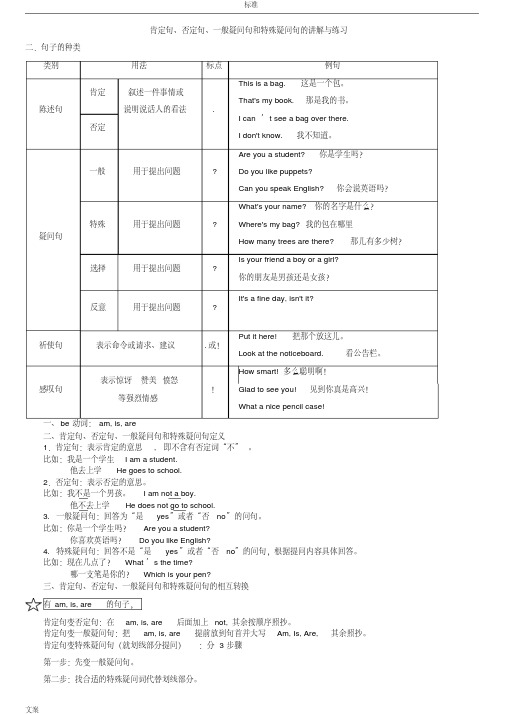
肯定句、否定句、一般疑问句和特殊疑问句的讲解与练习二.句子的种类类别用法标点例句陈述句肯定叙述一件事情或说明说话人的看法.This is a bag.这是一个包。
That's my book.那是我的书。
否定I can’t see a bag over there.I don't know.我不知道。
疑问句一般用于提出问题?Are you a student?你是学生吗?Do you like puppets?Can you speak English?你会说英语吗?特殊用于提出问题?What's your name?你的名字是什么?Where's my bag?我的包在哪里How many trees are there?那儿有多少树?选择用于提出问题?Is your friend a boy or a girl?你的朋友是男孩还是女孩?反意用于提出问题?It's a fine day, isn't it?祈使句表示命令或请求、建议.或!Put it here!把那个放这儿。
Look at the noticeboard.看公告栏。
感叹句表示惊讶赞美愤怒等强烈情感!How smart!多么聪明啊!Glad to see you!见到你真是高兴!What a nice pencil case!一、be动词:am, is, are二、肯定句、否定句、一般疑问句和特殊疑问句定义1.肯定句:表示肯定的意思, 即不含有否定词“不”。
比如:我是一个学生 I am a student.他去上学 He goes to school.2.否定句:表示否定的意思。
比如:我不是一个男孩。
I am not a boy.他不去上学 He does not go to school.3. 一般疑问句:回答为“是yes”或者“否no”的问句。
比如:你是一个学生吗? Are you a student?你喜欢英语吗? Do you like English?4. 特殊疑问句:回答不是“是yes”或者“否no”的问句,根据提问内容具体回答。
(完整版)小学英语一般疑问句、否定句和特殊疑问(附习题)(可编辑修改word版)
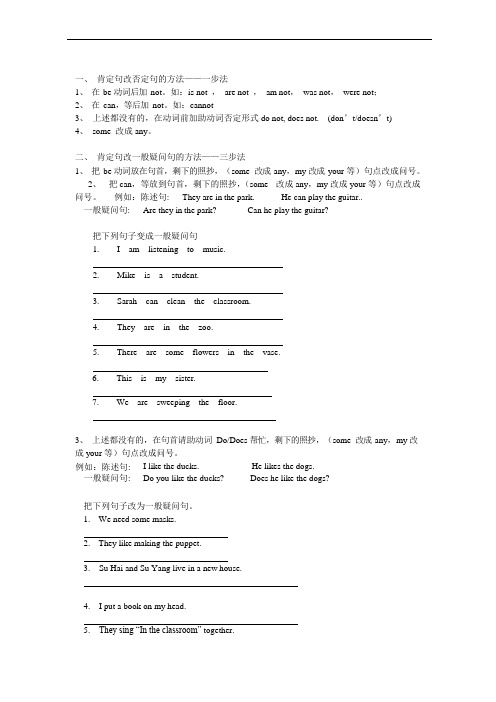
一、肯定句改否定句的方法——一步法1、在be 动词后加not。
如:is not ,are not ,am not,was not,were not;2、在can,等后加not。
如:cannot3、上述都没有的,在动词前加助动词否定形式do not, does not. (don’t/doesn’t)4、some 改成any。
二、肯定句改一般疑问句的方法——三步法1、把be 动词放在句首,剩下的照抄,(some 改成any,my 改成your 等)句点改成问号。
2、把can,等放到句首,剩下的照抄,(some 改成any,my 改成your 等)句点改成问号。
例如:陈述句: They are in the park. He can play the guitar..一般疑问句: Are they in the park? Can he play the guitar?把下列句子变成一般疑问句1. I am listening to music.2. Mike is a student.3. Sarah can clean the classroom.4. They are in the zoo.5. There are some flowers in the vase.6.This is my sister.7.We are sweeping the floor.3、上述都没有的,在句首请助动词Do/Does 帮忙,剩下的照抄,(some 改成any,my 改成your 等)句点改成问号。
例如:陈述句: I like the ducks. He likes the dogs.一般疑问句: Do you like the ducks? Does he like the dogs?把下列句子改为一般疑问句。
1.We need some masks.2.They like making the puppet.3.Su Hai and Su Yang live in a new house.4.I put a book on my head.5.They sing “In the classroom” together.6.We play basketball on Sundays.7.Tom likes listening to music三、肯定句改特殊疑问句的方法——四步法1、在一般疑问句的基础上,句首添加一个疑问词即可,可根据划线部分确定是什么疑问词。
(完整版)小学英语一般疑问句和特殊疑问句(附练习题)(可编辑修改word版)
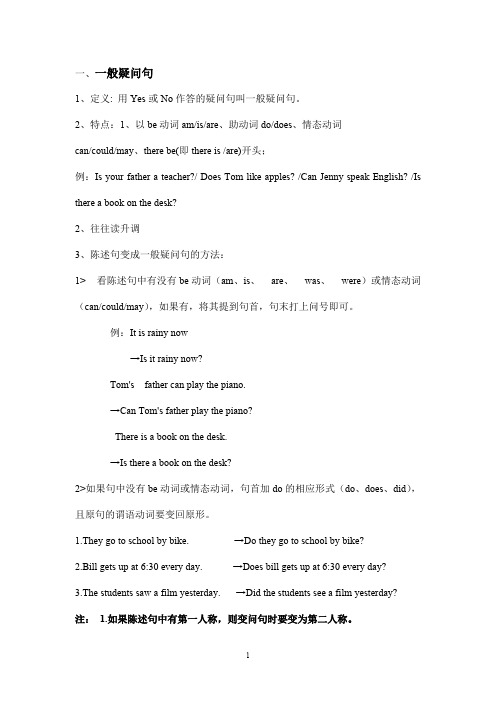
一、一般疑问句1、定义: 用Yes或No作答的疑问句叫一般疑问句。
2、特点:1、以be动词am/is/are、助动词do/does、情态动词can/could/may、there be(即there is /are)开头;例:Is your father a teacher?/ Does Tom like apples? /Can Jenny speak English? /Is there a book on the desk?2、往往读升调3、陈述句变成一般疑问句的方法:1> 看陈述句中有没有be动词(am、is、are、was、were)或情态动词(can/could/may),如果有,将其提到句首,句末打上问号即可。
例:It is rainy now→Is it rainy now?Tom's father can play the piano.→Can Tom's father play the piano?There is a book on the desk.→Is there a book on the desk?2>如果句中没有be动词或情态动词,句首加do的相应形式(do、does、did),且原句的谓语动词要变回原形。
1.They go to school by bike. →Do they go to school by bike?2.Bill gets up at 6:30 every day. →Does bill gets up at 6:30 every day?3.The students saw a film yesterday. →Did the students see a film yesterday?注: 1.如果陈述句中有第一人称,则变问句时要变为第二人称。
I usually have lunch at school. →Do you usually have lunch at school?2.如果陈述句中有some, 则变问句时往往要变成any 。
(完整版)小学英语特殊疑问句练习(带答案解析)(可编辑修改word版)

牛津英语小学部分语法——特殊疑问词一.特殊疑问句单词意思用法when 什么时间问时间who 谁问人whose 谁的问主人where 在哪里问地点which 哪一个问选择why 为什么问原因what 什么问东西what time 什么时间问时间what colour 什么颜色问颜色what about …怎么样问意见what day 星期几问星期what date 什么日期问具体日期what for 为何目的问目的how …怎么样问情况how old 多大问年龄how many 多少问数量how much 多少问价钱how about …怎么样问意见how far 多远问路程练一练1、A: is the boy in blue? B:He’s Mike.2、A: wallet is it? B:It’s mine.3、A: is the diary? B:It’s under the chair.4、A: is the Chirstmas Day? B: It’s on the 25th of December.5、A: are the earphones? B:They are 25 yuan.6、A: is the hairdryer? B:It’s blue.7、A: is it today? B:It’s Sunday.8、A: was it yesterday? B: It was the 13th of October.9、A: this red one? B:It’s beautiful.10、A: is it from here? B:It’s about two kilometre away.11、A: Can I have some paper and some crayons?B: ? A: I want to make a kite.12、A: one is fatter, the blue one or the red one? B: The blue one.13、A: is your cousin? B: He’s 15 years old.14、A: do you have dinner? B: At 6 o’clock对划线部分提问。
(完整word版)小学英语一般疑问句练习题及答案
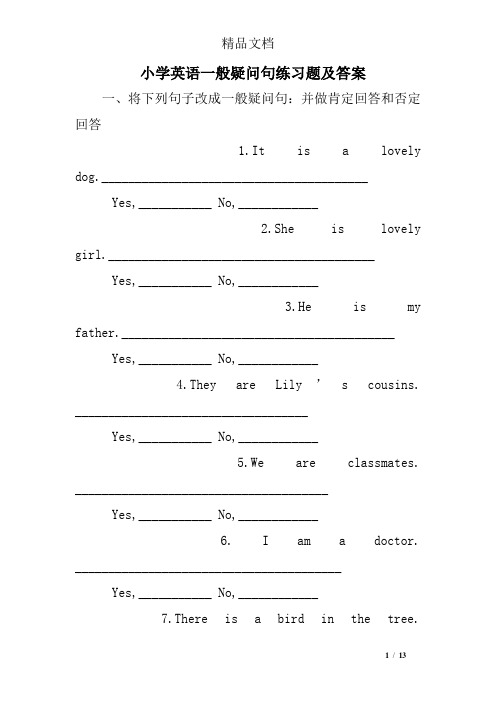
7.There is a bird in the tree.________________________________
Yes,___________ No,____________
8.There are many stars in the sky. ____________________________
Yes,___________ No,____________
有be的就be+not
没有Be的就在主语的后面+do not或does not
把肯定句改为疑问句就是有be的就把be提到前面来,
没有be的就在句首加do或 does
Eg: I am a teacher. ----I am She likes singing.------She like singing.
Yes,___________ No,____________
3.He is my father._________________________________________
Yes,___________ No,____________
4.They are Lily’s cousins. ___________________________________
Are they /you/ we late? Yes ,they/ you/we are./ No,they /you/we are not.
有be的就be+not
没有Be的就在主语的后面+do not或does not
把肯定句改为疑问句就是有be的就把be提到前面来,
没有be的就在句首加do或 does
小学英语一般疑问句和特殊疑问句(附练习题)
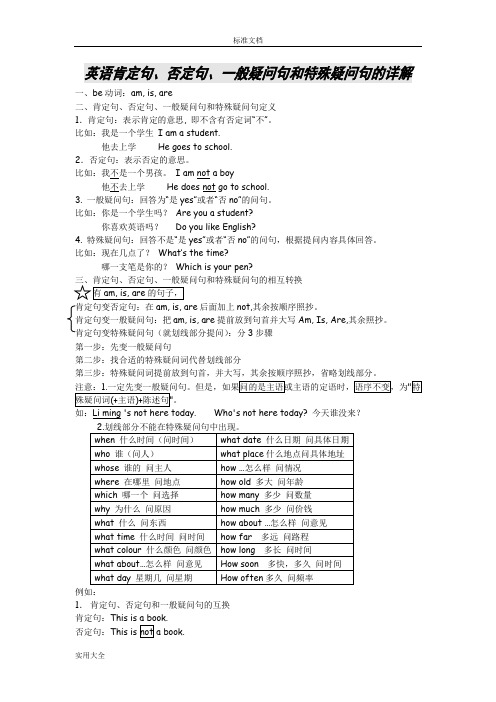
英语肯定句、否定句、一般疑问句和特殊疑问句的详解一、be动词:am, is, are二、肯定句、否定句、一般疑问句和特殊疑问句定义1.肯定句:表示肯定的意思, 即不含有否定词“不”。
比如:我是一个学生I am a student.他去上学He goes to school.2.否定句:表示否定的意思。
比如:我不是一个男孩。
I am not a boy他不去上学He does not go to school.3. 一般疑问句:回答为“是yes”或者“否no”的问句。
比如:你是一个学生吗?Are you a student?你喜欢英语吗?Do you like English?4. 特殊疑问句:回答不是“是yes”或者“否no”的问句,根据提问内容具体回答。
比如:现在几点了?What’s the time?哪一支笔是你的?Which is your pen?am, is, are后面加上not,其余按顺序照抄。
肯定句变一般疑问句:把am, is, are提前放到句首并大写Am, Is, Are,其余照抄。
:分3步骤第一步:先变一般疑问句第二步:找合适的特殊疑问词代替划线部分第三步:特殊疑问词提前放到句首,并大写,其余按顺序照抄,省略划线部分。
如:Li ming 's not here today.Who's not here today? 今天谁没来?例如:1.肯定句、否定句和一般疑问句的互换肯定句:否定句:一般疑问句:Is this a book?肯定回答:Yes, it is.否定回答:No, it isn’t.2.就划线部分提问(变特殊疑问句)This is a book.第一步:变一般疑问句Is this a book?第二步:找合适的特殊疑问词Is this what ?第三步:特殊疑问词提前放到句首,并大写,其余按顺序照抄,省略划线部分。
do not或者does not,其余按顺序照抄动词用原形肯定句变一般疑问句:在句首加do或者does并大写,其余照抄。
一般疑问句和特殊疑问句

特殊疑问词+助动词+主语+动词原形+其他? eg: Where do you do study English? 特殊疑问词+be动词+主语+其他? eg: Why is your Mum so angry? 特殊疑问词+情态动词+主语+动词原形+其他? eg: What can I do for you?
2.and变为or。如: I have a knife and a ruler. →I don't have a knife or a ruler.
变成一般疑问句练习题并作出回答 1. His father is an English teacher. 2. These cats are crying. 3. They can swim. 4. They like to read English. 5. He likes English. 6. His father goes to work by bus. 7. He is crying under the tree. 8. We must clean our classroom. 9. Mrs. Li and Kitty are in a big shop. 10 Kitty is wearing her new uniform.
Bill gets up at 6:30 every day. →Does bill get up at 6:30 every day? The students saw a film yesterday. →Did the students see a film yesterday?
三.陈述句变一般疑问句应注意的事项 陈述句变成一般疑问句除了遵循上述规则以外,还应注意下列几 点: 1.如果陈述句中有第一人称,则变问句时最好要变为第二人称。 例:I usually have lunch at school. →Do you usually have lunch at school? My father is playing soccer. →Is your father playing soccer? 2.如果陈述句中有some, 则变问句时往往要变成any 。 例: There is some water on the playground. →Is there any water on the playground? 3.复合句变一般疑问句通常只变主句,从句不变。 例:I know he comes from Canada. →Do you know he comes from Canada? 4.如果句中含有实义动词have且表示“有”时,除借do外,也可将其 直接提到句首。 例:I have some friends in America. →Have you any friends in America?/Do you have any friends in America?
(完整版)六年级英语一般疑问句和特殊疑问句专项.doc
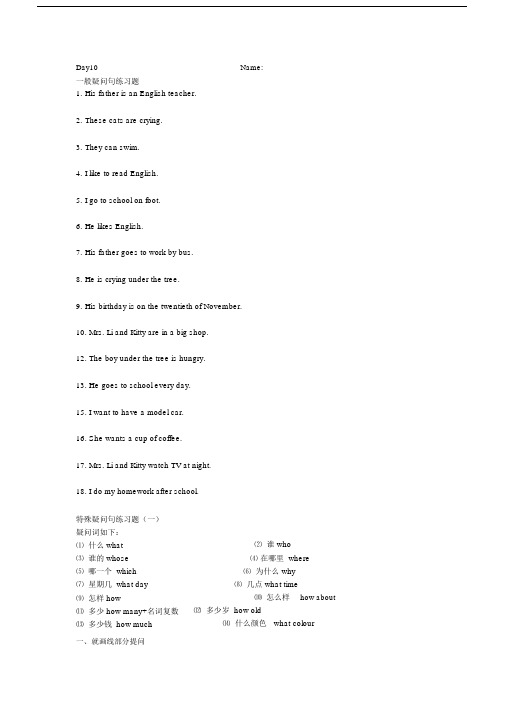
Day10Name: 一般疑问句练习题1.His father is an English teacher.2.These cats are crying.3.They can swim.4.I like to read English.5.I go to school on foot.6.He likes English.7.His father goes to work by bus.8.He is crying under the tree.9.His birthday is on the twentieth of November.10.Mrs. Li and Kitty are in a big shop.12.The boy under the tree is hungry.13.He goes to school every day.15.I want to have a model car.16.She wants a cup of coffee.17.Mrs. Li and Kitty watch TV at night.18.I do my homework after school.特殊疑问句练习题(一)疑问词如下:⑴什么 what⑶谁的 whose⑸哪一个 which⑺星期几 what day⑼怎样 how⑾多少 how many+名词复数⒀多少钱 how much⑵谁 who⑷在哪里 where⑹为什么 why⑻几点 what time⑽ 怎么样how about ⑿多少岁 how old⒁什么颜色what colour一、就画线部分提问1.He is my father.2.They are under the tree.3.I often watch TV after dinner.(晚饭后)提示:饭后强调的是时间问题。
4. Lily swims in the swimming pool.(游泳池)5.I often brush my teeth in the evening.5. Alan likes to play with Bill.7. Joe's father plays badminton(羽毛球) every weekend.8.The supermarket is near the school.9.The computer is on the table.10. The flowers are in the flower pot(花盆).11. My grandpa took us to the zoo.12. The monkey sleeps at night.二、句型转换。
小学英语一般疑问句和特殊疑问句附练习题

汇报人:XX
目录
01 单问句练习题
添加章节标题
小学英语疑问 句类型
一般疑问句
定义:以助动词、情态动词或be动词开头,表示询问事实或观点的疑问 句。 结构:助动词/情态动词/be动词+主语+谓语+其他?
示例:Do you like apples?(你喜欢苹果吗?)
添加 标题
例子:What time does the train arrive?(火车什么时候到达?)
小学英语疑问 句练习题
一般疑问句练习题
Do you like apples? Is this your book? Can you swim? Are you a student?
特殊疑问句练习题
什么是特殊疑问句? 特殊疑问句的结构是什么? 特殊疑问句的常见形式有哪些? 如何回答特殊疑问句?
感谢您的观看
汇报人:XX
练习题:将陈述句改为一般疑问句。
特殊疑问句
添加 标题
定义:特殊疑问句是用来对句子中的某一 特定部分提问的疑问句,通常以“what”、 “when”、“where”、“why”、 “how”等疑问词开头。
添加 标题
结构:特殊疑问句的结构为“疑问词+助 动词+主语+谓语+其他成分”。
添加 标题
用法:特殊疑问句通常用于获取具体信息, 例如询问时间、地点、原因等。
(完整word版)一般疑问句和特殊疑问句练习题
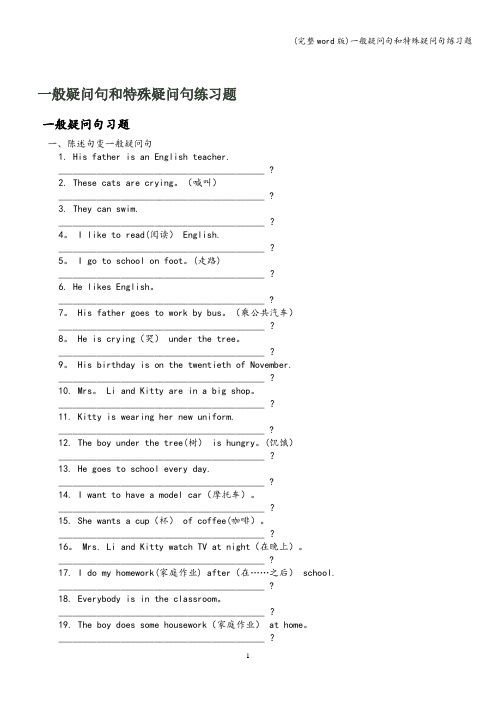
一般疑问句和特殊疑问句练习题一般疑问句习题一、陈述句变一般疑问句1. His father is an English teacher.___________________________________________ ?2. These cats are crying。
(喊叫)___________________________________________ ?3. They can swim.___________________________________________ ?4。
I like to read(阅读) English.___________________________________________ ?5。
I go to school on foot。
(走路)___________________________________________ ?6. He likes English。
___________________________________________ ?7。
His father goes to work by bus。
(乘公共汽车)___________________________________________ ?8。
He is crying(哭) under the tree。
___________________________________________ ?9。
His birthday is on the twentieth of November.___________________________________________ ?10. Mrs。
Li and Kitty are in a big shop。
___________________________________________ ?11. Kitty is wearing her new uniform.___________________________________________ ?12. The boy under the tree(树) is hungry。
(完整版)一般疑问句、特殊疑问句

陈述句含义:用于陈述事实和观点的句子。
陈述句包括肯定结构和否定结构。
This is a desk. (肯定结构)He can sing and dance. (肯定结构)He doesn't have a computer. (否定结构)There aren 't any pictures. (否定结构)肯定句变否定句:1. be 动词的否定式be:am ,is ,are,was were 构成否定式时,一律在后面加否定词not He is reading. →He is not reading. They are from China. →They are not from China.2. 情态动词的否定式情态动词:can, could, must , may, might, will, would ,shall,should ,need, ⋯⋯构成否定式时,一律在情态动词后面加否定词not I can swim. → I can not swim. You should arrive here on time.→You should not arrive here on time.3. 实意动词的否定句实意动词:即行为动词, 表示动作的动词。
它分为及物动词和不及物动词两种(及物动词是指后面要求有宾语的动词;不及物动词指后面不需要跟宾语的动词)构成否定式时,要借助助动词do, does, did ,在一般现在时中用do 或者does,在一般过去时中用did 。
结构为:主语+don't doesn't didn 't+动词原形+其它I like pop music. → I don ' t like pop music.She often swims. → She doesn't often swim. He handed in his homework.→He didn ' t hand in his homework.一般疑问句含义:一般疑问句是疑问句的一种。
- 1、下载文档前请自行甄别文档内容的完整性,平台不提供额外的编辑、内容补充、找答案等附加服务。
- 2、"仅部分预览"的文档,不可在线预览部分如存在完整性等问题,可反馈申请退款(可完整预览的文档不适用该条件!)。
- 3、如文档侵犯您的权益,请联系客服反馈,我们会尽快为您处理(人工客服工作时间:9:00-18:30)。
一、一般疑问句
1、定义:用Yes 或No 作答的疑问句叫一般疑问句。
2、特点:1、以be 动词am/is/are、助动词do/does、情态动词
can/could/may、there be(即there is /are)开头;
例:Is your father a teacher?/ Does Tom like apples? /Can Jenny speak English? /Is there a book on the desk?
2、往往读升调
3、陈述句变成一般疑问句的方法:
1> 看陈述句中有没有be 动词(am、is、are、was、were)或情态动词(can/could/may),如果有,将其提到句首,句末打上问号即可。
例:It is rainy now
→Is it rainy now?
Tom's father can play the piano.
→Can Tom's father play the piano?
There is a book on the desk.
→Is there a book on the desk?
2>如果句中没有be 动词或情态动词,句首加do 的相应形式(do、does、did),且原句的谓语动词要变回原形。
1.They go to school by bike. →Do they go to school by bike?
2.Bill gets up at 6:30 every day. →Does bill gets up at 6:30 every day?
3.The students saw a film yesterday. →Did the students see a film yesterday? 注:1.如果陈述句中有第一人称,则变问句时要变为第二人称。
I usually have lunch at school. →Do you usually have lunch at school?
2.如果陈述句中有some, 则变问句时往往要变成any 。
There is some water on the playground. →Is there any water on the playground 4、一般疑问句的回答。
例:Does she clean her room every day? Yes, she does.
Is Anna′s father a doctor? No,he isn′t.
Can she dance? Yes,she can..
如果问句主语是this that,回答时用it 代替;若问句主语是these, those,回答时用they 代替。
--Is this your bag?
--Yes, it is ./ No, it isn’t.
--Are those your books?
--Yes, they are. / No, they aren’t.
练习:
1.His father was an English teacher.
2.These cats are crying.
3.They can swim.
4.I went to school on foot.
5.His father goes to work by bus.
6.Mrs. Li and Kitty can sing English songs..
7.Kitty is wearing her new uniform.
8.The two boys under the tree were hungry.
9.Mrs. Li and Kitty watch television at night.
10.I can finish my homework by myself.
11.I have some good friends.
12.They cleaned their rooms and finished their homework yesterday.
二、特殊疑问句
1、定义:以疑问词开头,对句中某一成分提问的句子叫特殊疑问句。
常用的疑
问词有:what ,who, whose ,which, when, where ,how , why 等。
2 、语序:
1.如疑问词作主语或是对主语提问,其语序是陈述句的语序:疑问词+谓语动
词+其他成分?
如:1)Who is singing in the room﹖2)Where is he?
2.如疑问词作其他成分,即对其他成分提问,其语序是:疑问词+一般疑问句?
如:1)what class are you in﹖2)What does she look like﹖
注:回答特殊疑问句时,不能用yes /no,即问什么答什么。
如:Where's the restaurant﹖It is near the station.
练习
一、选择正确的单词填空
(who, where, when,what)
1.is that pretty girl? She is my sister.
2.are Jack and Tom? They are behind you.
3.do you go to school? I go to school from Monday to Friday.
4. has a beautiful flower? John has a beautiful flower.
5.are they doing? They are cleaning their rooms.
6.is my mother? She is in the living room.
7.are you going to do tomorrow? We are going to swim.
8.do Jim and Wendy play ball? They play ball in the afternoon.
9. does he have for breakfast? He has milk and bread.
10. are you from? I'm from Changchun city.
二、就画线部分提问
1.H e is my father.
2.T hey are under the tree.
3.I often watch TV after dinner.(晚饭后)
4.L ily swims in the swimming pool.(游泳池)
5.S uperman flies in the sky.
6.I often brush my teeth in the evening.
7.A lan likes playing with Bill.
8.T he supermarket is near the school.
9.J ennifer has a pair of earrings(耳环).
10.The flowers are in the flower pot(花盆).
11.The monkey sleeps at night.。
